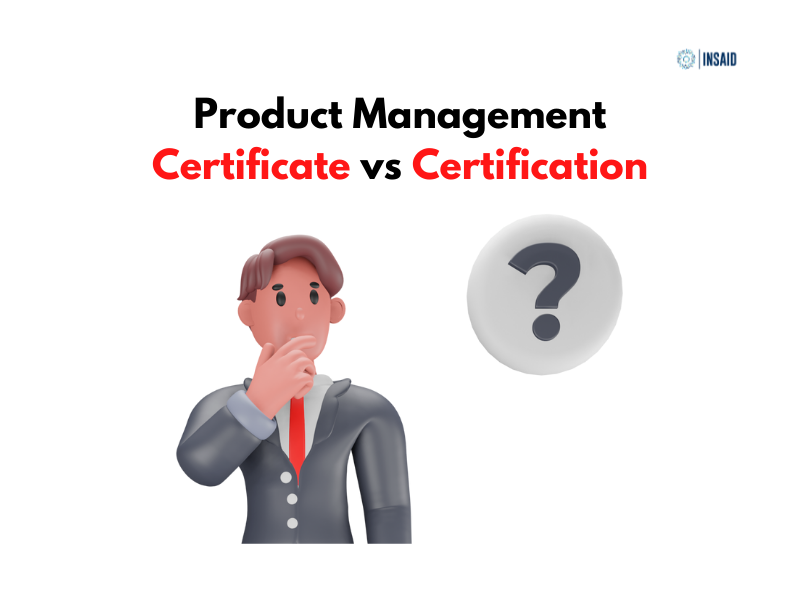Product Management is one of the most substantial job profiles in today’s day and age. But how does one become a product manager? Is it by acquiring a certificate or a certification? What is the difference?
This blog will help you understand the differences between the two most common proof points we see: certificates and certifications.
Product Management Certificates
Certificates are the most common type of proof points we see. Courses that offer certificates are designed for students to achieve some level of knowledge in a given topic or subject matter.
They may be of varying length of study and also of varying breadth or depth of material. Certificates are issued by the same party that is creating and delivering the content. The provider may bestow a certificate of completion to any participant of a course.
Some courses are designed with a quiz or short test at the end of a lecture prior to the delivery of a certificate.
Courses that offer certificates are the most common because there is no standard or requirement for their creation.
One should evaluate a course to see whether they will receive a certificate of completion or a certificate based on some degree of testing to make the certificate more meaningful.
Product Management Certifications
More rigorous courses prepare a student to receive a Certification by passing an exam offered by an independent third-party. Multiple companies can provide a course designed to prepare a student for the same certification exam.
They may cover some different topic areas, but they must align with the topics on the certification exam to properly prepare a student to pass the exam. This means that the courses have an independent standard or benchmark for the content they deliver.
If too many students take the exam and don’t pass, the course provider will quickly earn a poor reputation.
Certification exams are also much more rigorous when it comes to quality. The exams are proctored by a third-party entity that must follow industry standard rules for certification.
These exams are often timed such that it would be difficult to “cheat.” Obtaining product manager certification means receiving a passing grade on the exam. Merely showing up for the exam is not enough.
What’s the difference?

Given the rigours of a true certification exam, when a professional passes the exam and achieves certification, they have real proof that they have mastered the subject matter. Certificates on the other hand are merely a sign of completion and don’t typically measure proficiency with the material.
Unfortunately, some companies that offer certificates try to make them look like certifications. They can use marketing techniques to create a false sense of offering a credential, which is a disappointing and misleading practice.
They can even try to use the term ‘Certified’ to describe their learning program, to capitalise on the misunderstanding.
However, the difference is easy enough to tell. Just check to see who is offering the credential. If the same company that delivers the training provides the certification, then it is not a true certification. You are only receiving a certificate of completion.
Why does it matter?
Certificates are distributed by the same companies that offer the knowledge program. Their value and quality therefore are not determined independently.
Rather the company can set its own rules and processes to define who receives a certificate and who doesn’t. This can sometimes lead to low standards, including mere attendance.
While the terms sound similar, earning a certification is not the same as receiving a certificate.
Receiving a certificate demonstrates that a person has taken a course to gain knowledge in a particular skill area. Earning a certification affords the candidate both the title ‘Certified’, as well as demonstrates the candidate has a thorough understanding of the subject matter.
Key Point
To restate the premise at the start, what is most important in choosing a knowledge program is first to learn from it, and next to prove it.
Because product management certification requires learning to a standard that is much more rigorous than receiving a certificate, you can be sure to learn the most important content and material that meets an industry standard.
However, that is not to say that certificates are not valuable. They too can prepare you for your role. And of course, no certification is going to take the place of real-life experience.
So, while there are still many more considerations to make before choosing a program and to invest your time, energy and resources into, we hope this blog has helped you make an informed decision on whether to get a certificate or to get certified.
 Pin
PinIf you are interested in the latter, visit our certification page to check out some great options and get on your way to an industry-standard level of excellence in product management.






